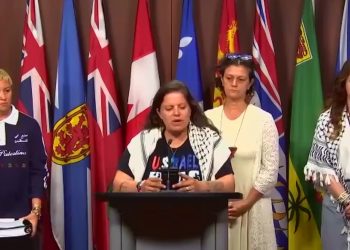In 2024, Israel illegally stole 23.7 square kilometres of land from Palestinians in the occupied West Bank. This number alone totaled more land than previously stolen over the past 20 years.
The ongoing dispossession of Palestinian land is part of the violent Israeli settler colonial project. Most recently, Israeli Finance Minister Bazalel Smotrich announced a new settlement project that would cut off the occupied West Bank from East Jerusalem and oversee the development of 3,400 Israeli homes. In his announcement, Smotrich claimed the idea of a Palestinian state was “being erased.”
Since its occupation in 1967, Israel has established approximately 160 colonial settlements in occupied West Bank that house close to one million Israelis. The UN Human Rights Chief Volker Turk has previously commented on the matter by saying “the establishment and continuing expansion of settlements amount to … a war crime under international law.”
Article 49 of the Geneva Convention states that “the Occupying Power shall not deport or transfer parts of its own civilian population into the territory it occupies.” Yet, according to Peace Now, an Israeli activist organization that monitors state colonial violence, there is an additional 131 outposts and 136 farm outposts in occupied West Bank as of May 2025. Outposts are community-driven Israeli settlements established since 1990 without government approval.
There are close to three million people living in occupied West Bank, and 85 per cent of the population is Palestinian. As part of the ongoing settler colonial project, Palestinian farmers, their lands, crops, livestock and agricultural structures are subject to violence, attack and threats.
Between October 2023 and December 2024, there were at least 276 reports of violent attacks against Palestinian farmers that often included the use of firearms as an intimidation tactic to scare and harass farmers. According to reports, over a third of these attacks or threats occurred around the period of olive harvest. Insecurity Insight’s 2025 report claims “the violence, coupled with severe restrictions on access to agricultural land for Palestinian farmers, has deprived farmers of their livelihoods, forcibly displaced communities, led to the adoption of negative coping strategies, and reduced food security.”
This is not a new issue. The Arab Group for the Protection of Nature (APN), is an independent non-profit focusing on the protection of the environment and natural resources of Arab countries. They document how for 70 years, Israeli forces have been systematically uprooting, burning and stealing olive and other fruit trees to displace and dispossess Palestinians of their lands and to further Israeli settler colonialism. Upwards of three million trees have been destroyed since 2000. This number includes 1.62 million olive trees, 100,000 date palms, and 2.17 million fruit trees.
“I am a farmer from Al-Khader town, which is surrounded by many settlements. When its time to tend to the land, the Israeli army sends me away despite knowing my intention to maintain it. Their aim is to destroy our land and prevent it from being productive,” attests a Palestinian farmer from Al-Khader, located seven kilometres from Jerusalem.
In response, APN has been replanting trees and rebuilding key agricultural infrastructure since 2001 to support Palestinian sovereignty, food security, heritage and culture. For every one tree destroyed by Israeli forces and community-based violence, APN intends to plant ten in its place.
According to environmentalist and founder of APN, Razan Zuayter, “all the problems of the world are aggravated in Palestine. You see the attack on [the] environment and agriculture is used as a weapon. Destroying trees, destroying livelihoods.” The uprooting of these trees, is linked to the uprooting of Palestinians, “an intentional war against livelihoods,” says Zuayter.
However, with the support of APN, Palestinian farmers continue to seed resistance. “They uprooted our trees for the third time, but we are ready- we will plant them again and again,” says a Palestinian farmer in Salfit.
Recently, APN Agricultural Advisor Hassan Al Jaajaa concluded a speech delivered during a International League of People’s Struggles (ILPS) meeting by stating that “[I]ndigenous peoples of the region alone are capable of standing firm in the face of wars—as they have done throughout history.”
APN has currently planted upwards of two million trees following their motto: “they uproot a tree in Palestine…we plant ten.” In realizing this commitment, APN hopes to plant five million trees by the end of 2025. Those who wish to support the planting of trees in Palestine can make a one time or re-occurring financial contribution. For those unable to make a financial contribution and still wish to support the work of APN, are encouraged to volunteer in one of the many needed positions. APN will match skills to one of the many roles that include, conducting research, designing informational materials, distributing advocacy materials and performing office work.
Maren Savarese Knopf is an emerging interdisciplinary scholar and PhD student at UNB. Originally from Treaty 4, she now resides on lands guided by the Wabanaki Confederacy.



![Palestinian photojournalist documents ‘uninhabitable’ Gaza Strip [video]](https://nbmediacoop.org/wp-content/uploads/2025/09/Photo-from-David10-350x250.jpg)
![New Brunswick prof travelling to Egypt-Gaza border to call for end of blockade [video]](https://nbmediacoop.org/wp-content/uploads/2025/05/shutterstock_2576513645-350x250.jpg)


![Pay equity legislation covering private sector, care sector coming next year: Holt [video]](https://nbmediacoop.org/wp-content/uploads/2025/10/PayEquityOct172025-120x86.jpg)
![Tenants target Moncton-area landlord, call for government to end ‘rent control loopholes’ [video]](https://nbmediacoop.org/wp-content/uploads/2025/10/JohnskyOct172025-120x86.jpg)

